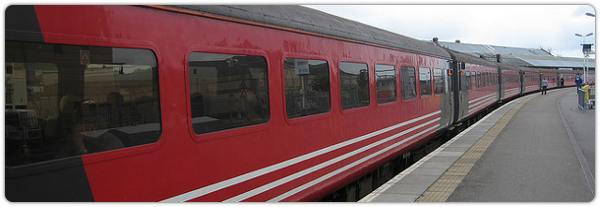 A couple of days ago, the Government announced plans to spend £33bn on a new high speed train line HS2 from London to Birmingham and then on to Leeds and Manchester. The new line, which will take around 20 years to build, will see journey times from Birmingham to London reduced by about 25 minutes and Leeds to Birmingham reduced by about an hour. £33bn is a lot of money to spend on reducing journey times between some of Britain's cities but the investment is largely being sold as a way to boost UK economy, across the entire country. But is it faster trains or faster broadband that this business nation needs ..?
A couple of days ago, the Government announced plans to spend £33bn on a new high speed train line HS2 from London to Birmingham and then on to Leeds and Manchester. The new line, which will take around 20 years to build, will see journey times from Birmingham to London reduced by about 25 minutes and Leeds to Birmingham reduced by about an hour. £33bn is a lot of money to spend on reducing journey times between some of Britain's cities but the investment is largely being sold as a way to boost UK economy, across the entire country. But is it faster trains or faster broadband that this business nation needs ..?
From A to B
One benefit of a faster train is that it will allow business people to spend less time travelling and more time at their meeting or doing other work. While that's true in 20 years time who are going to be the business leaders doing those meetings? It's today's teenagers who today spend their time on FaceTime or Skype or Twitter. Increasingly, we will see an ever more reliance on technology to allow us to communicate better, especially in the business world where expensive face-to-face meetings no longer need be the norm.
Is it worth it?
How much does an average meeting cost? Even just the travel cost could run to several hundred pounds and - albeit significantly reduced travelling time - there's still the inconvenience of time travelling. Today laptops have built-in web cams and phones that enable video calling. Imagine what the next 20 years will bring to improve communication? Are holographic communication devices like George Lucas imagined in Star Wars out of the question? Video calling on your TV like Back to the Future II with Skype is already here and is Charlie Brooker's vision of virtual worlds and every wall a TV screen that far away? Last year, when we celebrated our 15th birthday, we looked at what the Internet would offer 15 years in to the future; among the findings was the suggestion face recognition would become part of your home security.
The Digital Age
In the time it takes to build the new train line we may well see all of this happen. Business will always have face-to-face meetings but the amount of meetings that will be conducted remotely - over the Internet - will increase as the technology advances and makes those meetings more productive and more comfortable. As these meetings start to be conducted by a generation that hasn't known life without being online and being able to communicate virtually anywhere and everywhere, face-to-face meetings will be seen as an increasingly alien concept. Supporting all of this will be the fixed and mobile data networks, and to drive it, we'll need superfast broadband for everyone in their home. To paraphrase Doc Brown:
"Rails? Where we're going we don't need rails!"
What do you think's more critical when it comes to boosting the UK economy, superfast trains or superfast broadband? Let us know by leaving a comment below ...